|
A quick note before we get going. There are spoilers ahead, at least for newcomers to the film who've not yet read a plot outline or translated the film's original Italian title. If you want to go in completely cold, as I did, avoid all story synopses – including the one on the Radiance press release – and skip to the final paragraph of the main review (or click here to do so automatically). For the rest, let's go.
In common with other poliziotteschi works from genre master Fernando Di Leo, 1974 Shoot First, Die Later (a glorious but inaccurate translation of an Italian original that I'll get to in a short while) opens with a violent bang when a warehouse in which a small-time criminal gang is doing business is visited by mob boss Pascal (Raymond Pellegrin) and five of his men. They announce their arrival by shooting up the poor fool charged with guarding the door with a machine gun, and after a quick lesson from Pascal about whom they should buy their illicit goods from, the rest are ruthlessly beaten before bullets are sprayed into their legs. Message received, I'd say.
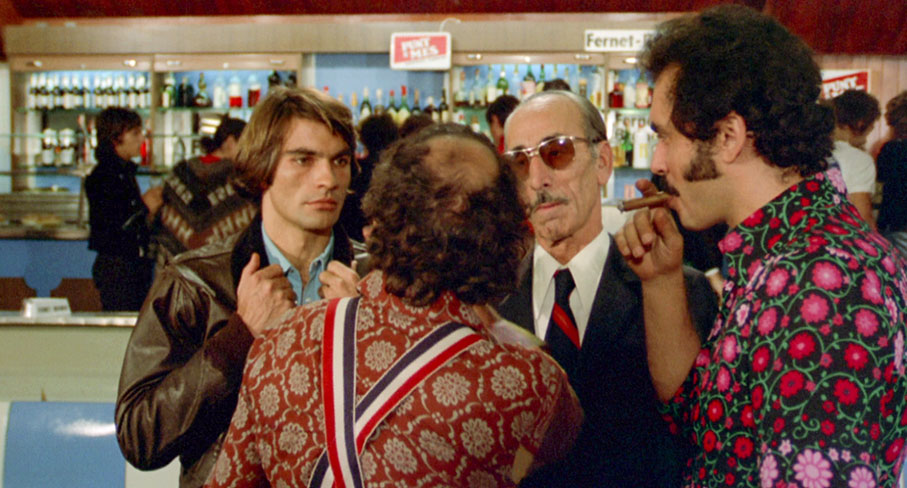
The opening titles follow, under which we watch the middle-aged Esposito (Vittorio Caprioli) as he reacts with understandable irritation at the discovery that some inconsiderate dickhead has blocked the exit from his house with their Porsche just as he was heading out to buy some food for his demanding cat. When the titles conclude, the location switches to a local bowling alley, where a man named Domenico Malacarne (Luc Merenda) and an older associate whose name is never mentioned meet with cheerfully excitable Portuguese criminals Rio (Elio Zamuto) and Rabal (Massimo Sarchielli) about a transport job that requires four drivers. Throughout the conversation that follows, Malacarne remains icily calm as he questions the two men about the contents of the lorries and their destination, enquiries that the perennially upbeat Rio and Rabal dance around answering. As he and his colleague depart, Malacarne remains unemotionally non-committal, which the two Portuguese somehow find highly amusing. No doubt about it, Malacarne is one cool criminal.
The next day, Malacarne is having coffee in a café with his girlfriend Sandra (Delia Boccardo) and watching through the window at something that seems to be unfolding across the road outside. He then bids Sandra a polite farewell and steps outside just in time to intervene in a jewellery store robbery, knocking the getaway driver cold and shooting one of the robbers after he guns down the store owner for raising the alarm. The remaining robber hijacks a car, and is chased across town at breakneck speed by a police car driven by Malacarne's partner, Rosario Borelli (Pietro Garrito), while Malacarne sits calmly in the passenger seat offering directions. Wait a minute, this cool customer of a criminal is actually a cop who was previously working undercover? Alright, then. The chase is finally brought to an end with a collision after the two cars end up in a game of chicken in a road too narrow for the cars to successfully pass each other, after which Malacarne bundles the robber into the back of the battered police car and congratulates his partner on holding his nerve during the chase.
Back at the station, Malacarne and Borelli watch cynicall from the back of a conference room as their Superintendent (Gianni Santuccio) talks up this successful operation to bring down this gang of murderous jewel thieves to the gaggle of attentive press representatives. As their superior rattles on, Malacarne cynically equates the whole thing to a TV show in which the host will soon introduce him as its star, which seconds later is exactly what unfolds. The diplomatic Malacarne plays along, but afterwards casually bushes the whole thing off as no big deal to pretty reporter Barbara (Monica Monet). Not only is Malacarne a tough, determined and just ever so slightly cynical detective, he's also modest about his considerable achievements. Not only that, but his Carabinieri father, Marshal Malacarne (Salvo Randone), is waiting outside the station to proudly congratulate his son on his latest success. Wow, could this good-looking young detective be any more of an icon of police determination, integrity and career success?
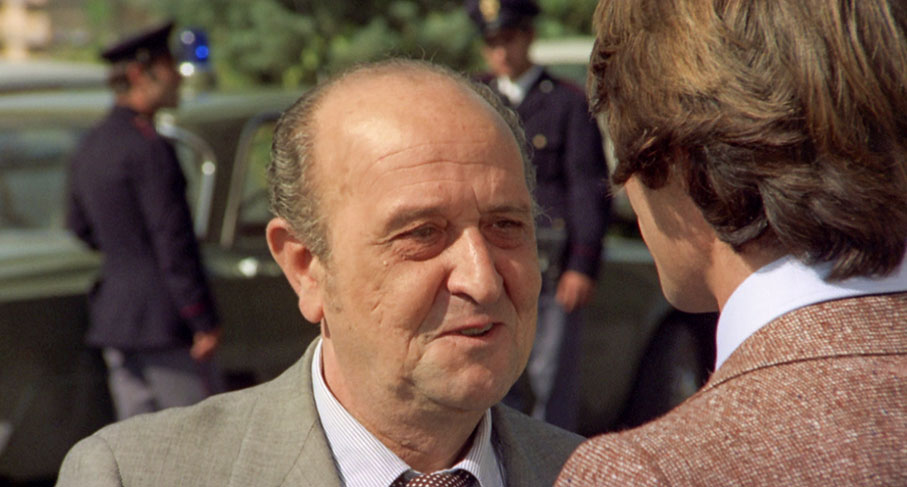
We're then given a clear illustration of the different paths that the police careers of this father and son duo have taken, when Malacarne leads a small team to arrest the two Portuguese criminals and single-handedly disarms them and knocks them to the ground, then heads back to his attractive artist girlfriend's apartment for a bit of rest and relaxation, so to speak. His father, on the other hand, returns to his mediocre office in a provincial precinct, where he is wearily tasked with handling the latest in a long line of trivial complaints from the aforementioned Esposito, who has come to the station to report the Porsche that was blocking his gateway. Marshal patiently hears him out and even personally types up the report, seemingly tolerant of his lot in the knowledge that his son has risen through the ranks and is now regarded as the top detective in his department. Time, I think, for that second spoiler warning, as although what I'm about to reveal occurs only a third of the way in, it still caught me by surprise.
Malacarne is in a planning meeting with the Superintendent and a whole team of detectives when he gets a call from a man named Gianmaria (Gino Milli), about whom I'll have more to say in a minute. He tells Malacarne simply that "they're all here" and that he is expected, and after some initial resistance, Malacarne confirms that he will be there soon. The meeting place in question is a shuttered apartment on a housing estate, where he's greeted by Gianmaria, a handful of hard-nosed looking goons, and a smilingly polite man named Dr. Nazzari (Richard Conte), who is effectively the consigliere to Pascal, the violent mob boss from the pre-title scene. Pascal tells Malacarne that they need to talk, before which Nazzari hands a sizeable wadge of notes to Malacarne. "This is for this month, Commissioner," he tells him, "with the raise that we agreed on." Malacarne instantly pockets the money, and for the third time in less than 30 minutes I was forced to completely reappraise this man. Of course, if your Italian is up to the job then this will come as less of a surprise, as the original Italian title of the film is Il poliziotto è marcio, which I gather translates as "The cop is rotten." Not a whole lot of room for ambiguity there.
Over the course of Malacarne's less than cordial interactions with Pacal and Nazzari it becomes evident that even the most seemingly random and inconsequential elements of the story so far are in some way interconnected. It turns out, for instance, that the two Portuguese men that Malacarne arrested were arranging the delivery of a shipment of weapons for Pascal, who thus leans on Malacarne to write his report in a way that will enable them to walk free and flee the country. More problematic for Malacarne is the news that the Porsche that was parked outside of Esposito's house belonged to an associate of Pascal who is keen that the official police report on the incident should be made to disappear. Pascal thus asks – and later demands – that Malacarne brings the report to him, and given his connections it seems likely that he is well aware that it was Malacarne's father who filed that report. Despite Malacarne's claim that it will not be a problem, it absolutely is and proves to be the trigger for a downward spiral that risks destroying not just Malacarne's career but also the lives of everyone he cares for.
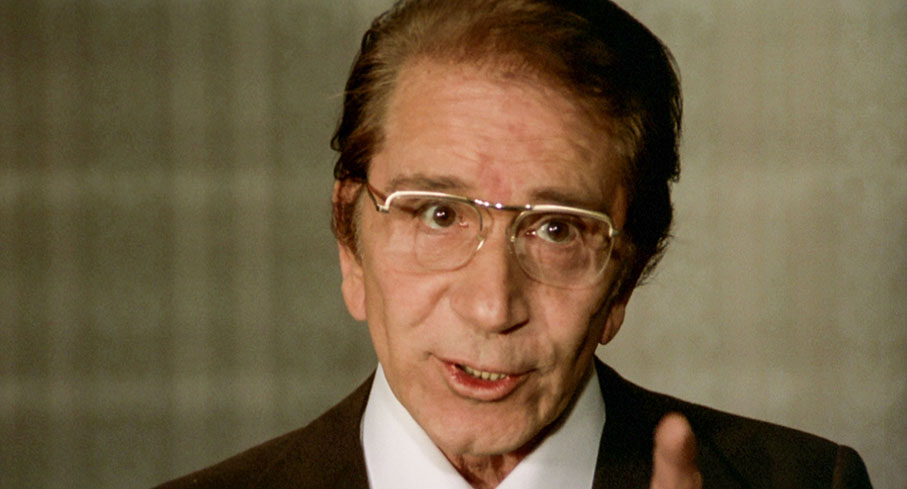
In what may be the most cynical of his poliziotteschi movies to that date, writer-director Fernando Di Leo and story writer Sergio Donati go for broke with an antihero of a central character whose corruption develops into a lethal plague of criminality in a seamless mix of crime drama, film noir and revenge thriller. There's absolutely no romanticising of the mafia here, something especially evident in the ruthless actions of the mafioso goons, who at one point overstep a line that even hardened viewers might baulk at, particularly as the act in question is shot in a manner that feels distressingly real. Malacarne may be a dirty cop, but by delaying the revelation about his ties to the mob until the 30-minute mark, the bond that audience has formed with him by then proves oddly difficult to break, particularly given the immorality and extremity of the actions taken by the mobsters to punish him for non-compliance, or to clean up anything Pascal regards as a loose end.
It's an increasingly dark and discomforting tale, but like its Milieu Trilogy predecessors Milano calibro 9 (1972), The Italian Connection (La mala ordina, 1972) and The Boss (Il Boss, 1973), Di Leo keeps the drama gripping and spices it up with genuine thrills, here in the shape of two breathless car chases that bookend the film. Both were the work of prolific stunt co-ordinator Rémy Julienne and his team (who unusually are credited for their contribution in the opening titles), and both are blisteringly staged, filmed and edited, as well as being genuinely exciting to watch. When the violence comes, meanwhile, it jolts not by being explicitly staged, but because of the callousness with which it is dished out, and it often feels designed to have an audience crying out for retaliation in a tale in which vengeance is bittersweet at best and self-defeating at worst.
France-born Luc Merenda makes for an intriguing leading man, with his good looks, surface cool and tough guy persona proving to be nothing more than the public face of a corrupt man who is lining his pockets doing favours for ruthless gangsters, and it's fascinating to watch as his initial unflappability crumbles when things take a downward turn. The scene in which he has to admit his failings to his father is probably the most emotionally uncomfortable in the film, in no small part due to how convincingly Salvo Randone emotes as the heartbroken Marshal. Having brought real gravitas to the role of mob boss Don Corrasco is DiLeo's previous The Boss, meanwhile, Richard Conte here plays a more diplomatic role, the faux-friendly face of Pascal's organisation and the only man in the later stages who is able to reach out to the by then desperately vengeful Malacarne. Yet just as with Malacarne in the early scenes, there's more going on beneath the surface with Nazzari than he chooses to initially reveal, something that only becomes evident late in the film following a flippantly offhand remark made to and about him by Pascal.
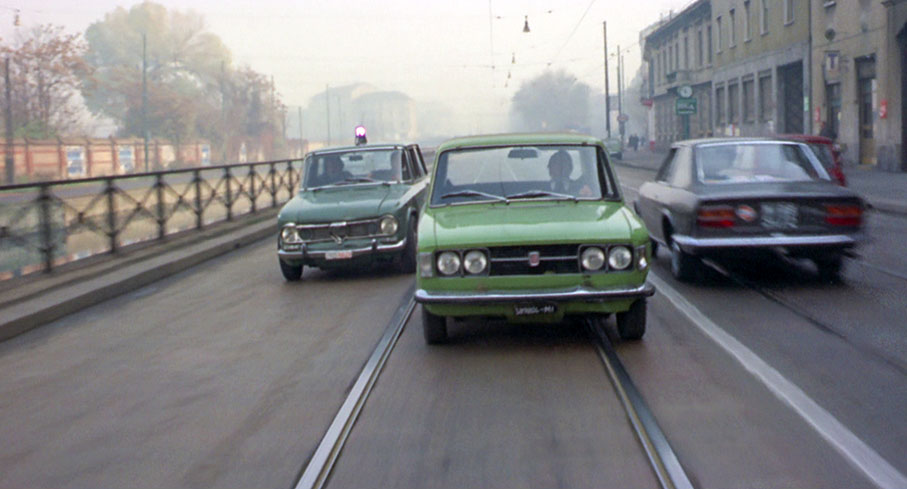
An argument could be made to see Shoot First, Die Later as something of a poliziotteschi greatest hits movie, so many of the genre's favourite elements do Di Leo and Donati cram into the 94 minute running time. We have a tough guy lead, corruption of officials, mafia criminality, a supporting cast of convincingly lived-in faces, unexpected plot twists, high octane shoot-outs, car chases, beatings, murders, a lethal bombing, and a whole lot more – we even get that old favourite of a speeding car ploughing through a pile of cardboard boxes that seemed to have been stacked there solely for that purpose. Less amusingly, we also have a too-common character from the era that will prompt a few winces from a progressive modern audience in the shape of Gianmaria, a camp but predatory and ultimately murderous gay man whose attempts to tickle Malacarne's fancy prompt outbursts of furious disgust. This aside, Shoot First, Die Later really holds up, a compellingly told, tightly directed, unforgiving, troubling, thrilling, deeply noir-inflected postscript to Di Leo's justly acclaimed Milieu Trilogy. And while I hate to harp on one particular point, those two car chases really are something.
Sporting a high-definition digital transfer from the original camera negative, the 1080p picture on this Radiance Blu-ray is a pleasingly solid one, with the slight softness evident in some interior wide shots sharpening up nicely on daylight exteriors, where the detail is very well defined and the contrast is pleasingly graded. Colour is generally naturalistic if just a tad muted on exterior scenes, although interior scenes do have a sometimes strong earthy hue, and the picture as a whole has a distinct early 70s vibe about it – had I not known when this film was made and released, I feel sure I could have hazarded a pretty damned accurate guess. No mention is made of any restoration work on the Radiance press notes, but I'm guessing some at least has taken place, as there's not a spot of dust or dirt anywhere and the image sits rock solidly in the 1.85:1 frame.
As so often with Radiance releases of Italian works of this period, both the original domestic Italian and the English international dubs have been included, here in DTS-HD Master Audio 2.0 mono. The expected tonal range restrictions aside, both are clear and free of any damage or obvious signs of wear.
Optional English subtitles kick on by default for the Italian track, and optional English subtitles for the deaf and hearing impaired are available for the English language track.
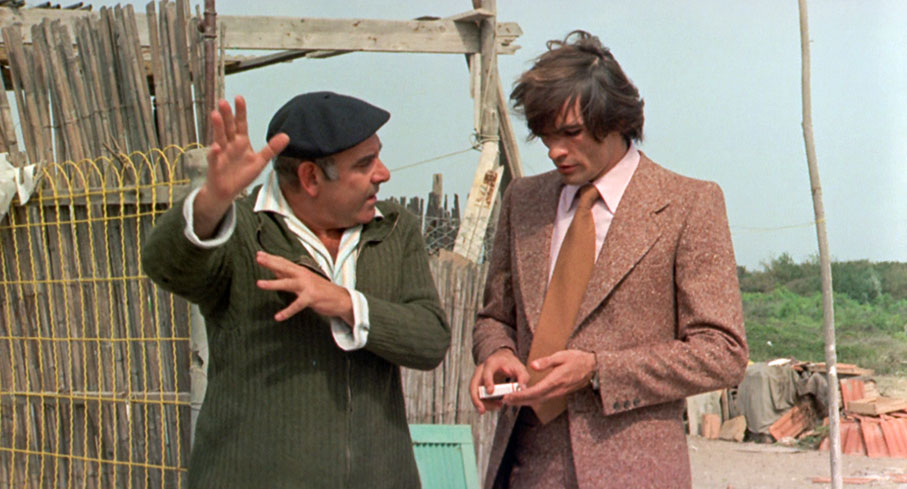
As for which language to go for, well, there's no clear-cut answer this time around. Both are post-dubbed, and while the Italian feels a better suit for the locale, Richard Conte clearly delivered his lines in English, though apparently did not dub his own voice on the English track. I tried watching the film with both tracks for comparison, and in the end sided with the Italian track, where the voices seemed to better suit the characters. This is especially true of Esposito, whose authentically over-excited babbling on the Italian track is replaced by an irritated New York twang on the English language track. There are also some occasional differences in the thrust of the dialogue on the two tracks. An early example comes during the conversation between Malacarne and Sandra while Malacarne is staking out the jewellery store robbery. On the Italian track, Sarah complains that she is sleepy, which Malacarne laughingly mocks, noting that she is sleepy all of the time. On the English language track she instead hints that she wants to return to bed for something else entirely, and to make sure we get what that is, there's an additional line when Malacarne looks out of the window at the getaway car and Sarah says, "Well… you turn me on." Classy.
This is also a rare occasion where I feel obliged to mention the cover art on Radiance's Blu-ray, which I have to presume was drawn from the original promotional artwork. Quite aside from the fact that in turns of nastiness it's up there with the once-banned VHS cover for Abel Ferrara's The Driller Killer, it's also just a little deceiving, as there is nothing even remotely as graphic in the film itself. If you go in expecting to see that image in the flesh, so to speak, you'll be in for a long wait. That said, it's still pretty cool, and the decision to stick it on the front cover of a disc that might sit on store shelves shows some balls.
Commentary by critic Travis Woods
You'll have no trouble knowing exactly how critic Travis Woods feels about Shoot First, Die Later, as he describes it as "perhaps not very best poliziotteschi film but the most poliziotteschi film" often enough for it to qualify as the commentary track's catch phrase. Woods' honesty is refreshing, however, when he admits up front that "I'm gonna wax a little pretentious here and there," only to then ground his comments by saying of poliziotteschi films, "We should never lose track of the fact that this genre is simply, absolutely, totally fucking cool." Woods has a lot to say about the film, from information on the actors and Fernando Di Leo to some thoughtful analysis of characters, scenes and even individual shots. He provides information on car stunt coordinator Rémy Julienne, offers an interesting reading of Luc Merenda's performance as Malacarne in the two car chase sequences and the key differences between both scenes, reveals that the story was actually (and, I presume, unofficially) based on the 1954 American crime novel Rogue Cop by William P. McGivern, reflects on how more realistically the mafia is portrayed in Italian poliziotteschi films when compared to American movies, and outlines the contents of a deleted scene before speculating on why it was ultimately removed. There's plenty more to get your genre teeth into here.
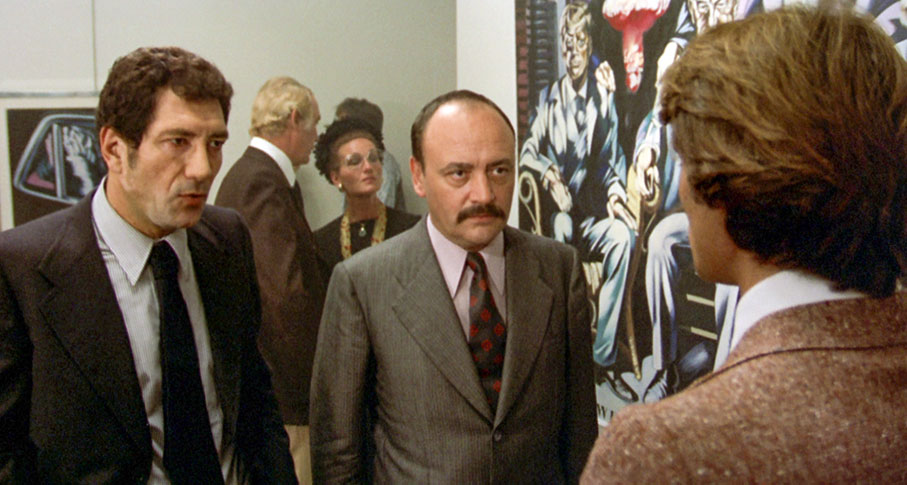
The Second Round of the Game (21:20)
An archive Italian featurette by Nocturno Cinema and Cinema Bis Communication in which assistant director Franco Lo Cascio, editor Amedeo Giomi and actor Luc Merenda all look back at the making of Shoot First, Die Later. Lo Cascio recalls first meeting actor Luc Merenda (whose role, he somewhat despairingly suggests, could have been played by anyone with a tough face), poking fun at director Di Leo's communist beliefs, shooting the high octane car chase sequences, and working with the same stunt team and producer Galliano Juso on subsequent films. Merenda remembers first meeting Di Leo and being surprised how different he was from the impression created by his films and reflects on why he likes this film and enjoyed playing the character of Malacarne. Giomi reveals that Di Leo was not invasive when it came to the editing process and would let him do his job, only adding a few suggestions when sequences were complete, and describes him as ingenious and brilliant at the dubbing process. He also tells an anecdote about the police confiscating Di Leo's collection of vases that his family recovered from archaeological digs, and how instead of getting upset, the director brought a lawsuit against the Italian state and won. A very worthwhile inclusion.
Master of the Game (24:58)
An archive interview – also conducted by Nocturno Cinema and Cinema Bis Communication – with writer-director Fernando Di Leo, who recalls first discovering noir through the books of Dashiell Hammett and the noir movies of Warner Bothers et al, explaining why he preferred these films to westerns (which he describes as "infantile films par excellence"), and why he felt a kinship with the characters in noir stories. He looks back at his early days as a scriptwriter and how he would adapt his style to serve different genres and directors, outlines how the police are portrayed differently in his films to the work of other filmmakers, and complains that journalists are not interested the concerns of young people. An animated and entertaining talker, Di Leo's unfiltered honesty sometimes catches you off guard, notably when he describes Franco Nero as "that sleepy head," and Alan Ladd as "a dreadful actor," though he does at least make a solid case for why he believes that "Caravaggio's greatness is on the horse's ass."
Italian trailer (3:21)
Gunfire, punches, kicks, car chases, explosions, angry confrontations and loving embraces are cut together with breathless ferocity in a trailer that does at least give a flavour of the film's content and style, albeit whilst delivering a string of plot spoilers.
English trailer (3:21)
The exact same trailer as above, but with English dubbed dialogue and narration.
Also included with the release disc is a Limited Edition Booklet featuring new writing by Sam Moore, but this was not available for review.
If you delighted in the poliziotteschi pleasures of Fernando Di Leo's Mileu Trilogy, then Shoot First, Die Later is an absolute must-have. Deeply cynical and ultimately downbeat it may be, but it still makes for a compelling watch, and the action, when it comes, is rivetingly staged. Once again, the film is impressively presented on Radiance's top-notch Blu-ray, with a strong transfer and a tight collection of complimentary special features. For fans of the genre, especially, warmly recommended.
|